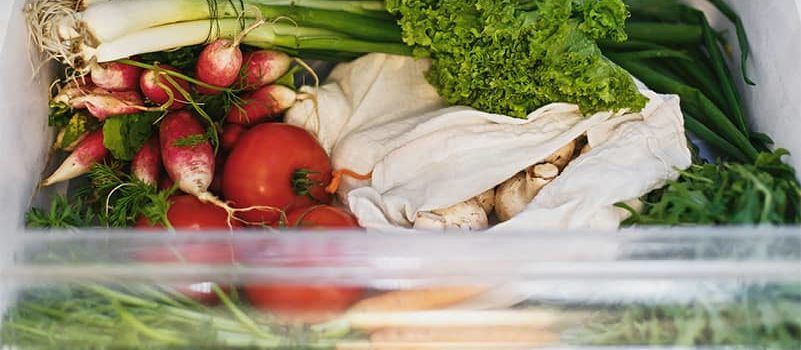The best way to prevent food waste is to plan your groceries. Once you’ve bought the food, it’s important to plan how you will use it to avoid having to throw it away. Because throwing food away is like throwing money away!
Here are four tips to help you avoid food waste.
1. Store food properly
Organizing your fridge makes it easier to see what’s inside. That way, you’re less likely to find old cheese in the back of the fridge. The same rule applies to your freezer and pantry. Taking the time to go through everything every once in a while is always a good plan!
Did you know that the temperature in your fridge varies from one area to another? That’s why every food should be stored in its proper place. Remember that the fridge is coldest at the top. That’s where you should store highly perishable foods, such as meat and fish.
Avoid storing milk and yogurt in the fridge door, as the temperature fluctuates every time you open it. Instead, use it to store condiments and beverages that tolerate frequent temperature changes, such as ketchup, mustard, canola oil and lemon juice.
2. Check the expiry date
When buying food, it’s a good idea to choose products with the latest expiry date possible. This will give you more time to consume them. However, this date can change once a product has been opened. A product’s shelf life after opening is sometimes indicated on the packaging. Otherwise, the Thermoguide can help you determine how long the product will keep. One trick is to mark the product with the date by which it should be consumed. This saves you from wondering when it was opened!
Freezing is an excellent option if you’re not sure you can finish a product before it spoils. Just make sure you remember what you have stored!
Expiry dates can also be useful when deciding how to store your food: keep foods with an earlier expiry date toward the front to be sure they are consumed first.
3. Put partially used items to use
Remember which partially used items you have stored in the fridge to use them quickly. Keeping a list on the fridge is an easy way to keep track of what to use first. Be sure to mark the date by which they should be consumed.
It’s important to store food properly in resealable containers to prevent it from drying out. This will also prevent odours from developing from foods like cheese and onions.
Are you tired of eating the same leftovers three days in a row only to end up tossing them in the trash? Here are two solutions:
· Freeze them
If you don’t think you can eat your leftovers within the next two or three days, freeze them right away. Many foods, including firm cheeses, cooked pasta and rice, and fruits and vegetables, freeze well. Remember to indicate the date on the container.
· Reinvent leftovers
Leftovers can also be used in soups, sandwiches, frittatas and stir-fries.
However you choose to use them, leftovers must be eaten as soon as possible. After two or three days, they may no longer be safe to consume and will end up in the trash. Any leftovers that have been kept at room temperature for more than two hours should also be thrown away.
4. Make the most out of foods nearing expiry
Use foods that are set to expire first to avoid waste! Despite your best efforts, some food may simply not keep. However, there may still be ways you can use it. Got wilted vegetables and overripe fruit hanging around? These can also be used for soups, compote or other recipes. We’ve shared a variety of tips in our article here.
In short, rotating your foods and knowing what’s in your fridge are key to preventing food waste. The less you waste, the more you and your family will have!
Original article posted on the Fondation Olo website (in French only)


